Black and white birds are not only the colors in contrast; they also contain splendid and distinct social and defensive behaviors and the ability to survive. This guide goes deep into 25 splendid black and white birds, which are individual in appearance, temperament, and peculiarities. Whether you are an experienced bird watcher or this list is your first step towards observing birds, it should excite you to see these marvels in the wilderness.
Unpublished qualitative research papers and qualitative data from quantitative studies were used in this systematic review and meta-synthesis study.
1. Black-and-White Warbler
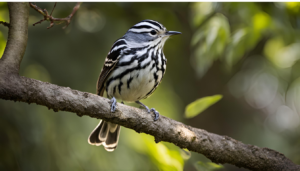
They have a zebra-like black and white strip-like structure and are cheery small birds that can frequently be seen darting along the trunk of a tree searching for ants. It has conspicuous color patterns that enable it to be spotted in the North American wooden area easily.
| Attribute | Description |
| Length | 12–15 cm (4.7–5.9 inches) |
| Weight | 8–15 grams (0.3–0.5 ounces) |
| Diet | Insects (ants, beetles, spiders) |
| Physical Features | Black and white stripes on head and body |
| Habitat | Deciduous forests in North America |
2. Magpie
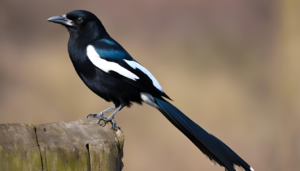
The magpie, well known as a brilliant bird, is a black and white bird with a metallic appearance. Usually seen in Europe and Asia, it has distinct long tails and is very aggressive.
| Attribute | Description |
| Length | 45–50 cm (17.7–19.7 inches) |
| Weight | 200–250 grams (7–9 ounces) |
| Diet | Insects, fruits, seeds, small mammals |
| Physical Features | White belly, iridescent black wings |
| Habitat | Countryside, urban areas |
3. Pied Avocet
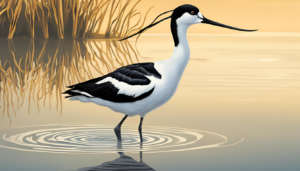
Pied Avocet is an elegant shorebird with long upturned bills and long legs that prefers to dwell in the coastal mark or wetland. This bird belongs to the order of Charadriiformes and its slim beak is used to sift feed in water that rarely exceeds half a meter deep.
| Attribute | Description |
| Length | 42–45 cm (16.5–17.7 inches) |
| Weight | 260–290 grams (9–10 ounces) |
| Diet | Aquatic insects, crustaceans |
| Physical Features | White body, black wings, slender legs |
| Habitat | Wetlands, salt marshes |
4. Black Skimmer

The black skimmer got its name from the way it feeds – after dipping the lower half of its bill into the water to pick fish. Given its white and black plumage and red bill, the bird is easily spotted on the coast during a visit to the beaches.
| Attribute | Description |
| Length | 40–50 cm (15.7–19.7 inches) |
| Weight | 280–450 grams (9.9–15.9 ounces) |
| Diet | Small fish, crustaceans |
| Physical Features | Black upper body, white underparts, red bill |
| Habitat | Coastal areas, estuaries |
5. White-Breasted Nuthatch

White-breasted nuthatch is a small bird that can descend down trunks as a head first, by having sharp claws. It is well known in North American woodlands due to the combination of black cap and white breast.
| Attribute | Description |
| Length | 13–15 cm (5.1–5.9 inches) |
| Weight | 18–30 grams (0.6–1.1 ounces) |
| Diet | Seeds, nuts, insects |
| Physical Features | Black cap, white face and belly |
| Habitat | Deciduous forests, mixed woodlands |
6. Black-Billed Magpie
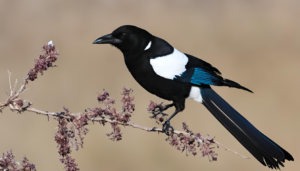
This bird is seen almost throughout North America and it is known for its curiosity and shiny black and white bird overtones. This gregarious bird is found in the open country and the city’s parks and gardens.
| Attribute | Description |
| Length | 45–60 cm (17.7–23.6 inches) |
| Weight | 145–210 grams (5.1–7.4 ounces) |
| Diet | Omnivorous: fruits, insects, small animals |
| Physical Features | Long tail, iridescent black, white belly |
| Habitat | Grasslands, urban areas |
7. Dark-Eyed Junco

Small, cute, black and white bird often visits feeders during winter and has sweet melodic calls. It has a gray color with white underparts, so one might see it jumping in the woods or backyard.
| Attribute | Description |
| Length | 13–15 cm (5.1–5.9 inches) |
| Weight | 18–30 grams (0.6–1.1 ounces) |
| Diet | Seeds, insects |
| Physical Features | Dark gray body, white belly |
| Habitat | Forests, gardens |
8. Rose-Breasted Grosbeak

Boasting of an easy-to-recognize rosy red chest patch this black and white bird is sighted in open woodlands mainly during migration in North America.
| Attribute | Description |
| Length | 18–21 cm (7–8.3 inches) |
| Weight | 35–43 grams (1.2–1.5 ounces) |
| Diet | Insects, fruits, seeds |
| Physical Features | Black head, white belly, red chest patch |
| Habitat | Open woodlands, gardens |
9. Downy Woodpecker

The downy woodpecker is nearly the size of a sparrow and has black wings and white underparts that are spotted in black it also uses its beak to rap on trees to hunt for insects. It is commonly used in parks and gardens as it gives a rhythmic effect on the natural environment.
| Attribute | Description |
| Length | 14–17 cm (5.5–6.7 inches) |
| Weight | 21–28 grams (0.7–1.0 ounces) |
| Diet | Insects, seeds |
| Physical Features | Black and white body with red patch on male’s head |
| Habitat | Woodlands, parks, gardens |
10. Lesser Black-Backed Gull
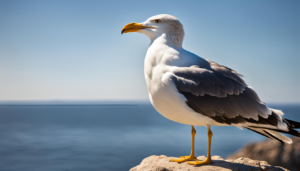
This beautiful black and white bird can be seen on the coastline of most European countries and, more recently, in the United States of America. The lesser black-backed gull is white with black wings and yellow legs; it is a lovely bird well suited to living in cities.
| Attribute | Description |
| Length | 52–64 cm (20–25 inches) |
| Weight | 600–800 grams (21–28 ounces) |
| Diet | Fish, crustaceans, small mammals |
| Physical Features | White body, black wings, yellow legs |
| Habitat | Coasts, lakes, urban areas |
11. Razorbill
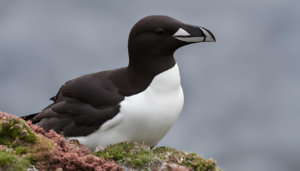
The razorbill is hence a type of puffin especially getting very close in the line and has a black upper side and white under part. Known as the Black and White Bird. This bird is a strong swimmer and feeds on fish therefore it’s best seen along rocky coastlines of the North Atlantic especially diving underwater.
| Attribute | Description |
| Length | 38–43 cm (15–17 inches) |
| Weight | 500–900 grams (17.6–31.7 ounces) |
| Diet | Small fish, crustaceans |
| Physical Features | Black upperparts, white belly, thick beak |
| Habitat | Rocky coasts, islands |
12. Atlantic Puffin

The Atlantic puffin features a painted colorful beak with bird a dark and white body, it can be considered as one of the most known sea birds. Inhabiting the shores of the North Atlantic, this bird has a rather grotesque look and is an active nesting gregarious bird.
| Attribute | Description |
| Length | 28–30 cm (11–12 inches) |
| Weight | 320–480 grams (11–17 ounces) |
| Diet | Small fish, crustaceans |
| Physical Features | Black upperparts, white belly, colorful bill |
| Habitat | Coastal cliffs, islands |
13. Common Loon

Loons have been described as black and white large water birds with a checkered dorsal area and a black pointed beak. This excellent diver is commonly associated with big water bodies in North America, especially within the Arctic Circle.
| Attribute | Description |
| Length | 66–91 cm (26–36 inches) |
| Weight | 2.7–6.3 kg (6–14 lbs) |
| Diet | Fish, crustaceans, insects |
| Physical Features | Black and white checkered body, red eyes |
| Habitat | Freshwater lakes, ponds |
14. American Oystercatcher
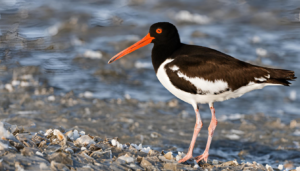
The Atlantic coast birding enthusiasts get thrilled shooting pictures of American oystercatchers, which are characterized by black and white bird plumage with a long orange bill. Famous for opening oyster shells, this seabird is easily remembered for its looks.
| Attribute | Description |
| Length | 40–44 cm (15.7–17.3 inches) |
| Weight | 400–700 grams (14–24 ounces) |
| Diet | Shellfish, crustaceans |
| Physical Features | Black and white body, orange bill |
| Habitat | Coastal beaches, estuaries |
15. Snow Goose

Generally the snow goose is a lovely bird that mainly has white plumage on its body apart from its wing tips which are black. Most impressive by the noise it makes by honking, it flies in large groups, offering an awesome sight across the North American skies.
| Attribute | Description |
| Length | 63–78 cm (24.8–30.7 inches) |
| Weight | 2.5–3.4 kg (5.5–7.5 lbs) |
| Diet | Aquatic plants, grains |
| Physical Features | White body, black wingtips |
| Habitat | Wetlands, agricultural fields |
16. Hooded Crow
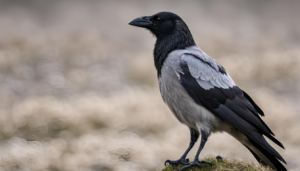
The hooded crow is characterized by light gray plumage, black head, wings, and tail and is distributed across Europe and Asia. It has been characteristic of growth both in the rural and urban regions due to flexibility.
| Attribute | Description |
| Length | 44–52 cm (17.3–20.5 inches) |
| Weight | 350–530 grams (12–18 ounces) |
| Diet | Omnivorous: insects, fruits, small mammals |
| Physical Features | Gray body, black head and wings |
| Habitat | Countryside, urban areas |
17. Mute Swan

The mute swan is a massive bird that has white plumage, a black facial cover, and a long neck. Well adapted to lakes and rivers, it is best known for its elegant styling in water.
| Attribute | Description |
| Length | 140–160 cm (55–63 inches) |
| Weight | 6.2–11.9 kg (13.7–26.2 lbs) |
| Diet | Aquatic plants |
| Physical Features | White body, orange bill with black base |
| Habitat | Lakes, rivers, ponds |
18. Ring-Billed Gull

One of the most familiar of the North American birds it is easily identified by the similarity in its name of the black ring that borders its yellow bill. This bird has a black and white color and can be found alongside lakes, rivers, and near the coastline.
| Attribute | Description |
| Length | 43–54 cm (17–21 inches) |
| Weight | 400–700 grams (14–24 ounces) |
| Diet | Fish, insects, small mammals |
| Physical Features | White body, gray wings with black tips |
| Habitat | Lakes, rivers, beaches |
19. Black-Necked Stilt

The black-necked stilt is a slender wading bird of the wetlands of the Americas with bright pink legs and black head and neck contrasting with white underparts.
Known as the Black and White Bird۔ Well known for its stylish manner of walking, this bird is rather fascinating to watch as it hunts for food bit in the shallow edge of the water body.
| Attribute | Description |
| Length | 33–40 cm (13–16 inches) |
| Weight | 150–200 grams (5.3–7 ounces) |
| Diet | Insects, small fish, crustaceans |
| Physical Features | Black head, white underparts, long pink legs |
| Habitat | Wetlands, marshes, shallow ponds |
20. Black Phoebe

The black phoebe is quite small and is part of the flycatchers family and has an albin dorsal side, and black ventral side. This tiny bird is usually found alongside the water bodies and feeds on insects on the wing. It is easily appreciated among bird enthusiasts because of its soft songs and atypical method of foraging.
| Attribute | Description |
| Length | 16 cm (6.3 inches) |
| Weight | 15–20 grams (0.5–0.7 ounces) |
| Diet | Insects, small fish |
| Physical Features | Black head and back, white belly |
| Habitat | Near water bodies, parks, urban areas |
21. Common Eider

The common eider duck is one of the largest ducks, mainly black and white birds in color, and breeds mainly in coastal areas in the Northern part of the world. Notably, the eider down feathers which are popularly used the eider is known to flock in large groups, especially during winter.
| Attribute | Description |
| Length | 50–71 cm (19.7–28 inches) |
| Weight | 1.8–2.8 kg (4–6 lbs) |
| Diet | Mollusks, crustaceans, small fish |
| Physical Features | Black and white plumage, stout body |
| Habitat | Coastal waters, rocky shorelines |
22. Yellow-Billed Magpie
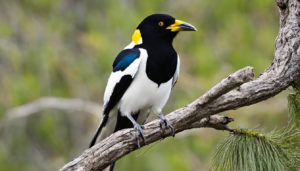
This bird special to California has black and white plumage with a bright yellow beak. Looking like other magpies, the yellow-billed magpie is a gregarious bird living in deciduous and oak forests, and meadowlands.
| Attribute | Description |
| Length | 40–50 cm (15.7–19.7 inches) |
| Weight | 150–180 grams (5.3–6.3 ounces) |
| Diet | Fruits, insects, small animals |
| Physical Features | Black and white body, yellow bill |
| Habitat | Oak woodlands, grasslands |
23. Eastern Towhee
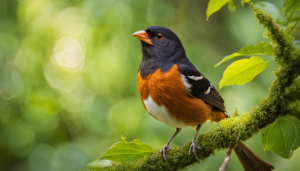
Like the song thrush, this bird is also known as the eastern towhee due to its placement having its common geographical range in the eastern United States; this bird has black, white, and rusty-brown feathers. It inhabits terrestrial habitats foraging on seeds and insects on the forest floor so it visits gardens and forest margins often.
| Attribute | Description |
| Length | 18–21 cm (7–8.3 inches) |
| Weight | 32 grams (1.1 ounces) |
| Diet | Seeds, insects, berries |
| Physical Features | Black head and back, white belly, rusty sides |
| Habitat | Forest edges, gardens, shrublands |
24. Black-Bellied Plover
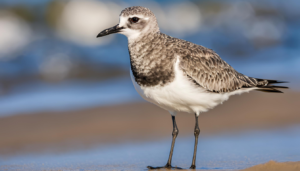
Black-bellied plover is also a migratory bird and this bird has a different appearance in summer and winter, its breeding plumage is very beautiful, black and white. This tern lives in areas near beaches tidal shores, and mud flats, exhibits a fine posture, and is characterized by large eyes.
| Attribute | Description |
| Length | 27–30 cm (10.6–11.8 inches) |
| Weight | 200–300 grams (7–10 ounces) |
| Diet | Insects, small crustaceans |
| Physical Features | Black and white during breeding season |
| Habitat | Coastal mudflats, shorelines |
25. Ring-Necked Duck
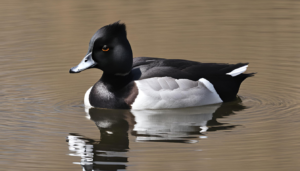
It is a bird of the diving type and it is of very beautiful appearance: the head and back of the ring-necked duck are black and the belly is white with a black stripe on its bill. This water species is widespread in North America’s wetlands but can be easily observed in freshwater lakes and ponds.
| Attribute | Description |
| Length | 39–46 cm (15.3–18.1 inches) |
| Weight | 500–900 grams (17.6–31.7 ounces) |
| Diet | Aquatic plants, insects, mollusks |
| Physical Features | Black head and back, white belly, ringed bill |
| Habitat | Freshwater lakes, marshes, ponds |
Conclusion
I stand to marvel at the rather phenomenal variations the black and white bird populations offer. These 25 species reveal the elegance and versatility of these wondrous birds, their peculiarities in terms of their conduct and appearance, as well as their preferred territory. Black and white birds: If you are interested in a bird that dives, skims, sings, or wades, then this section will cater to every nature lover’s needs.
FAQs
1. Are black and white birds difficult to identify?
Yes, black and white birds are usually easily seen due to the color difference and many of them have certain activities that will perfectly help in identifying them.
2. What is the origin of the black and white color in some birds?
Contrasting white and black feathers have a use in camouflage, to attract a mate, or sometimes to regulate body temperature. The black pigments cause the animals to be warmed when it is too cold external temperatures can be very useful in some regions.
3. Which habitats are best for spotting black and white birds?
These black and white birds exist in remarkably various settings including forests, swamps, seashores, and cities with parks and gardens. Seeing them can be made easier by a visit to these habitats.
4. Are all black and white birds migratory?
No, some of the birds such as black and white are migratory birds but others such as the black phoebe, and magpie do not migrate, they are resident birds.
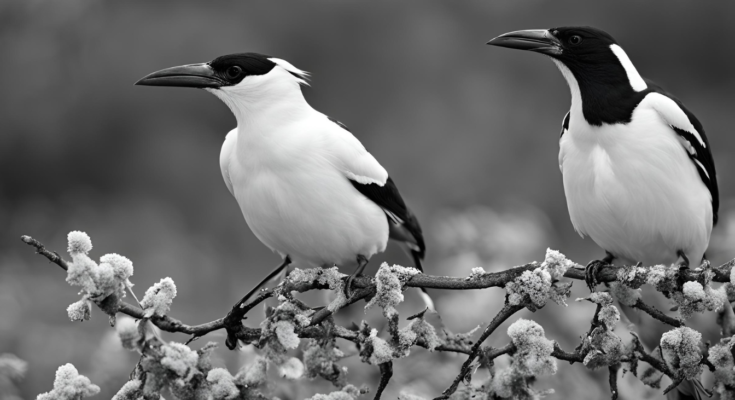
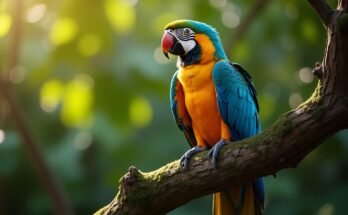


One Comment on “25 Best Black and White Birds – Facts, List, Pictures”